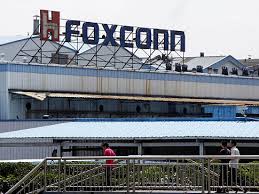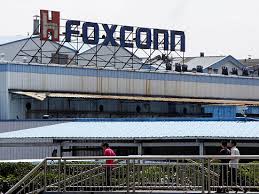
A day after the world's largest contract maker of electronic goods put its takeover of the Japanese firm on hold, the chief executives of Sharp Corp and Foxconn plan to meet in China, reported Reuters quoting a person familiar with the matter.
After sources said previously undisclosed liabilities were responsible for the last-minute hitch, Shares in Sharp slid 11 percent on Friday.
The Taiwanese firm said it would not sign the deal until it had clarified some "new material information" from Sharp just hours after the loss-making display maker announced it had decided to sell a two-thirds stake to Foxconn.
Foxconn's quest to gain Sharp's advanced screen technology and strengthen its hand with major client Apple Inc has been thrown in to doubt by the 11th hour delay despite an announcement - rarely heard of in major M&A talks.
The opening up of Japan's insular tech sector to foreign investment was also supposed to have been signaled by the deal.
Sources said that Sharp had contingent liabilities of around 300 billion yen ($2.7 billion).
One of the sources said that Foxconn’s own due diligence had revealed liabilities of only just under 100 billion yen.
It has been disclosing its contingent liabilities properly, Sharp said in a statement on Friday. A spokesman for Foxconn declined to comment on the issue. There were also no comments from Sharp on the planned meeting between Foxconn founder Terry Gou and Sharp CEO Kozo Takahashi.
The entire deal was in jeopardy, Jefferies analyst Atul Goyal said.
"This is especially so given the dramatic back and forth that happened between Sharp and Foxconn in 2012, when Foxconn agreed to acquire a stake in Sharp but then later walked away," he wrote in a note to clients.
Sources said that the creditor banks of Sharp have also said they were also not aware of the size of the contingent liabilities until the last minute.
It would issue around $4.4 billion worth of new shares to give Foxconn a two-thirds holding Sharop said in a 31-page filing. A source familiar with the matter has said that Foxconn's investment is set to total more than 650 billion yen ($5.8 billion).
Foxconn's position as Apple's main contract manufacturer would be boosted if the deal with Sharp goes through even as Gou has spent roughly five years courting Sharp. Mass-producing organic light-emitting diode (OLED) screens by 2018 would also be possible for Sharp. It would around this time that Apple is expected to adopt the next-generation displays for its iPhones. Apple would be able to wean itself off rival Samsung Electronics Co as a supplier if Foxconn managed to bring Shar under its umbrella.
In comparison to present display screens, OLED screens are thinner, lighter and more flexible. Heavy investments are also being made in this new technology by South Korea's Samsung Display and LG Display.
Lingering distrust over the collapse of the 2012 deal to form capital ties could impede the efforts to patch up the deal. According to sources, this distrust had tilted the deal in favor of a lower offer by a state-backed fund, the Innovation Network Corp of Japan.
(Source:www.reuters.com)
After sources said previously undisclosed liabilities were responsible for the last-minute hitch, Shares in Sharp slid 11 percent on Friday.
The Taiwanese firm said it would not sign the deal until it had clarified some "new material information" from Sharp just hours after the loss-making display maker announced it had decided to sell a two-thirds stake to Foxconn.
Foxconn's quest to gain Sharp's advanced screen technology and strengthen its hand with major client Apple Inc has been thrown in to doubt by the 11th hour delay despite an announcement - rarely heard of in major M&A talks.
The opening up of Japan's insular tech sector to foreign investment was also supposed to have been signaled by the deal.
Sources said that Sharp had contingent liabilities of around 300 billion yen ($2.7 billion).
One of the sources said that Foxconn’s own due diligence had revealed liabilities of only just under 100 billion yen.
It has been disclosing its contingent liabilities properly, Sharp said in a statement on Friday. A spokesman for Foxconn declined to comment on the issue. There were also no comments from Sharp on the planned meeting between Foxconn founder Terry Gou and Sharp CEO Kozo Takahashi.
The entire deal was in jeopardy, Jefferies analyst Atul Goyal said.
"This is especially so given the dramatic back and forth that happened between Sharp and Foxconn in 2012, when Foxconn agreed to acquire a stake in Sharp but then later walked away," he wrote in a note to clients.
Sources said that the creditor banks of Sharp have also said they were also not aware of the size of the contingent liabilities until the last minute.
It would issue around $4.4 billion worth of new shares to give Foxconn a two-thirds holding Sharop said in a 31-page filing. A source familiar with the matter has said that Foxconn's investment is set to total more than 650 billion yen ($5.8 billion).
Foxconn's position as Apple's main contract manufacturer would be boosted if the deal with Sharp goes through even as Gou has spent roughly five years courting Sharp. Mass-producing organic light-emitting diode (OLED) screens by 2018 would also be possible for Sharp. It would around this time that Apple is expected to adopt the next-generation displays for its iPhones. Apple would be able to wean itself off rival Samsung Electronics Co as a supplier if Foxconn managed to bring Shar under its umbrella.
In comparison to present display screens, OLED screens are thinner, lighter and more flexible. Heavy investments are also being made in this new technology by South Korea's Samsung Display and LG Display.
Lingering distrust over the collapse of the 2012 deal to form capital ties could impede the efforts to patch up the deal. According to sources, this distrust had tilted the deal in favor of a lower offer by a state-backed fund, the Innovation Network Corp of Japan.
(Source:www.reuters.com)





